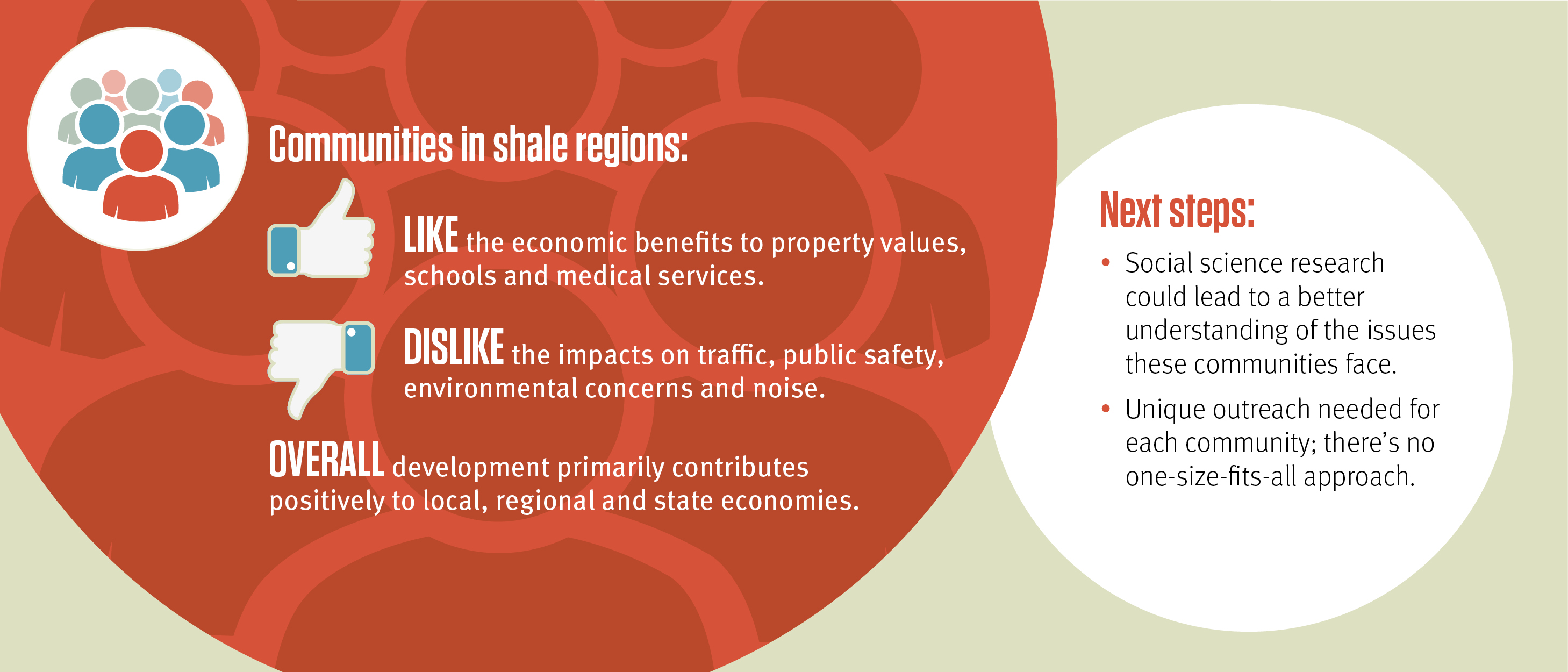Economic and Social Impacts
A small number of relatively recent studies have examined the objective and perceived economic and social impacts of shale oil and gas development in Texas.

Communities in shale regions:
- LIKE the economic benefits to property values, schools and medical services.
- DISLIKE the impacts on traffic, public safety, environmental concerns and noise.
- OVERALL shale oil and gas development primarily contributes positively to local, regional and state economies.
Next steps:
- Social science research could lead to a better understanding of the issues these communities face.
- Unique outreach is needed for each community; there’s no one-size-fits-all approach.
Frequently Asked Questions
What are the economic and social impacts of shale oil and gas development?
For the most part, shale oil and gas development contributes positively to local, regional and state economies, with some unintended consequences. Overall, community leaders and residents tend to welcome economic and service-related benefits and tend to dislike certain social and environmental issues.
As long as there is shale development, it will benefit local economies. However, there are negative economic consequences associated with these developments, including impacts to local infrastructure such as roads and increased cost of living, and not everyone within a community benefits equally from such developments.
What impact does perception have on shale development in a community?
The perception of shale development in a community—whether it’s positive or negative—is a driver of action at the community level. People are afraid of what they don’t know, and that can lead to action. When people are concerned about the environmental and social consequences that shale development may have on their community, the odds of them opposing this development on a local level are greatly increased.
Regardless of where the shale play is located, local residents are very concerned about the unknown social and environmental consequences of shale development.
Why is there limited economic and social impact research on shale development in Texas?
There are very few studies that have been done on the social and economic impacts of shale development in Texas. The fact that there are so many unanswered questions is a product of the fact that there hasn’t been enough study of these issues. As outlined in the report’s recommendations, additional research on these topics in Texas is encouraged.

“Local residents tend to welcome the economic benefits that come along with shale oil and gas development. However, they’re also very concerned about the unknown environmental and other social-level consequences that will emerge from the increased development.”
~Gene Theodori, Sam Houston State University
Economic and Social Impacts Findings
- Shale energy development primarily contributes positively to local, regional and state economies, but not all economic effects have been positive.
- Limited published data exist on the net economic benefits and costs of shale energy development to the institutions and residents in Texas counties and communities.
- Public school districts and universities across Texas benefit substantially from the taxes and royalty revenue paid by the oil and gas industry.
- Economic benefits associated with oil and gas development are unevenly distributed across public schools and universities.
- Community leaders and residents in Texas tend to appreciate and welcome the economic and service-related benefits that accompany shale energy development, whereas they tend to dislike certain social and/or environmental effects that accompany it.
- Traffic-related issues—including increased truck traffic, traffic accidents and traffic congestion—are of primary concern to leaders and residents in and around communities experiencing shale development.
- The oil and gas industry is viewed as a relatively trustworthy source for information on shale development and hydraulic fracturing.
- The more negatively shale energy development is perceived—particularly with respect to the social and environmental consequences—the more likely local residents are to engage in behaviors opposing increased shale development.
- Decisions regarding setback distances in Texas are established at the municipal level.
- Shale development has the potential to disproportionately affect certain segments of the population.
Economic and Social Impacts Recommendations
- Additional research on the economic benefits and costs and associated equity issues—or “winners and losers”—in shale energy development is warranted. The broad implications of shale development for local governments and public school districts also should be investigated.
- Additional research on the underlying factors accompanying the formation of both positive and negative perceptions of shale development is needed.
- Additional research is warranted to provide a more comprehensive understanding of the various factors that may be associated with behavior taken in response to or anticipation of shale development.
- Additional research is needed to examine the potential environmental and health effects associated with varying setback distances.
- Additional research on the uneven distribution of benefits and costs associated with development is warranted.

Gene Theodori (Lead)
Sam Houston State University

Omar Garcia
South Texas Energy & Economic Roundtable

Urs Kreuter
Texas A&M University
For media inquiries about economic and social impacts, please visit our Media Center page.

